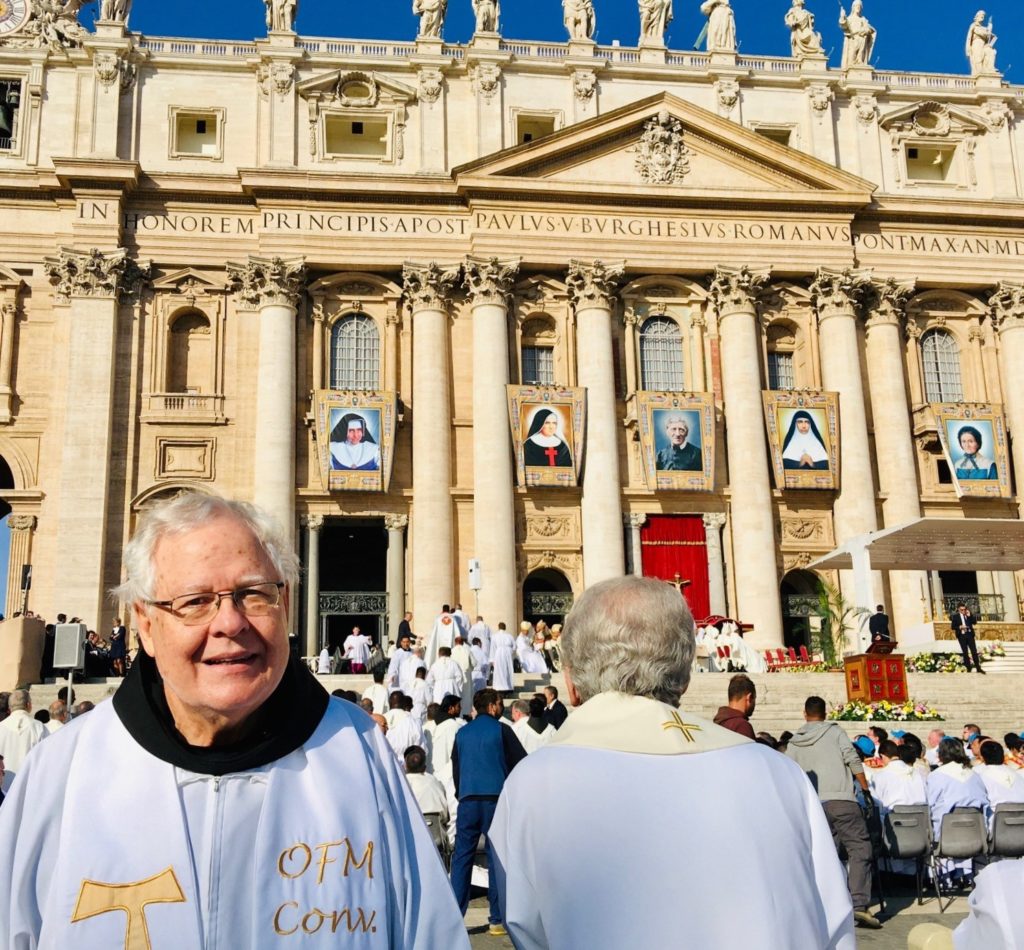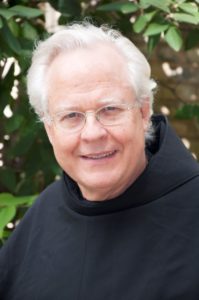
Our Lady of the Angels Province friar, Fr. Edward Ondrako, OFM Conv. attended the canonization of St. John Henry Newman in Rome on October 13, 2019.
9 October 2021-Feast of St. John Henry Newman
(21 Feb 1801 – 11 August 1890)
Texts: 28th Wk Yr B. Wis 7: 7-11; Heb 4:12-13; Mk 10:17-30.
Theme. “I loved Wisdom more than health and beauty”
(Wis 7:10);
Subtheme. “The word of God is able to judge the thoughts and intentions of the heart”
(Heb 4: 12);
Subtheme. “There is no one who has given up everything for my sake and the sake of the good news, who will not receive a hundredfold now, persecutions and …eternal life”
(Mk 10: 29-30).
Wisdom, The Harm Principle,[1] Truth and Conscience
“Certainly, if I am obliged to bring religion into after-dinner toasts, (which indeed does not seem quite the thing), I shall drink—to the Pope, if you please,—still, to Conscience first, and to the Pope afterwards.”[2] How do you interpret St. John Henry Newman’s toast in 1874? “I shall drink—to the Pope, if you please,—still, to Conscience first, and to the Pope afterwards.” Interpret Newman yourselves.
Think of crises in the Church from a broad historical perspective. The power of the subjective conscience of the faithful reaffirms the sureness of the Christian memory which is memory always learning. Memory proceeds from our sacramental identity and is able to distinguish a genuine unfolding of Christian recollection from a false memory. Memory remains the power of simple faith from the teaching of the apostles, events from the beginning of the Church, up to today. Today, we experience memory in an entirely new way. Pope Benedict XVI likens memory to discernment of spirits.[3]
Why are there increasingly venomous attacks on faith? It is not hard to answer if we think about the harm principle. To millions of secularist Americans, religion is now a bad thing. The secularist reasons that religious beliefs and practices inflict harm on people. Believers bear vigorous assaults when they express and act on the tenets of their faith. Whether at home, in church, or in their professions, no one is exempt from attack. Ken Starr observes the dramatic change in tune of a Catholic President from a stalwart defender of religious liberty for virtually his entire career to the change in tune during the 2020 campaign. Starr has several observations, but starts with Joe Biden’s vigorous attack of the Little Sisters of the Poor for their conscience-based objections to providing their employees with contraception services. Starr repeats: the plain truth is that true believers in our land of liberty harm no one.[4]
St. John Henry Newman’s after dinner toast has many admirers and detractors. Newman is interpreted in conflicting ways. One interpretation is that Newman meant there was no basis for listening to the teachings of the Pope because conscience amounted to a person’s state of knowing everything. That is wrong headed. Why? All power that the papacy has is power of conscience. No less than the greatest theologian pope in history, Pope Benedict XVI [5] agrees. The connection between the primacy of conscience and true sense of the teaching authority of the pope means the pope does not impose but explains Christian memory and defends it. Pope Benedict XVI sides with Newman’s toast to conscience first and to the pope afterword because without conscience there would not be a papacy.[6]
How does the teaching of the Pope relate to conscience? The true teaching of the primacy of the Pope and its correlation to the primacy of conscience is best understood in connection with Christian memory. The pope’s authority is as advocate of the Christian memory. Again, he does not impose, but explains and defends the Christian memory. As Newman, he defends that truth cannot contradict itself although it often appears to contradict itself. Respecting a person’s conscience means recognizing life as a personal quest for truth.
Using a biblical image as the Lord sent Moses, the Lord sent St. John Henry Newman to work many “signs and wonders.” Newman had to counter many hurtful venomous attacks on faith. Today, “cancel culture is powerful and increasingly relentless” (Starr). The signs indicate that these attacks on religious liberty will increase in the immediate future. Be ever watchful!
Watch closely for civil authorities who reinvent themselves because they loom as potentially dangerous enemies to religious liberty in America. Think about their worldview being promoted across this great land of freedom, a worldview growing and fueled by hostile secularism. Remember, secularists want to be the referee, the only referee. Newman’s life teaches watchfulness and how to respond.
The way hostile secularism plays out is a widespread lack of respect for individual conscience and dignity. As a constitutional interpreter and judge, Ken Starr convinces that our era witnesses open hostility to communities of faith. In 1874, St. John Henry Newman answered the criticisms of the Prime Minister, William Ewart Gladstone, for suggesting that Catholics are unable to think for themselves because of their loyalty to a foreign power, the Pope. Newman’s reply teaches how to form a true conscience. “Conscience has rights because it has duties.” We have a duty to obey our conscience.
“If a person is culpable in being in error, which he might have escaped, had he been more in earnest, for that error he is answerable to God, but still he must act according to that error, while he is in it, because he in full sincerity thinks the error to be the truth” (Letter to Norfolk, 259). Newman added an example that may seem silly but makes an important point about getting at the truth:
If the Pope told the English Bishops to order their priests to stir themselves energetically in favor of teetotalism, and a particular priest was fully persuaded that abstinence from wine, etc., was practically a Gnostic error,[7] and therefore felt he could not so exert himself without sin; …. that priest would commit a sin hic et nunc (here and now) if he obeyed the Pope, whether he was right or wrong in his opinion, and, if wrong, although he had not taken proper pains to get at the truth of the matter (Letter to Norfolk, 260).
St. John Henry Newman’s readers understood the term Gnostic error as false knowledge. Pope Francis uses gnostic person.[8] Pope Francis cautions that the gnostic person’s knowledge and unity is in the secularized power of technology alone: A nightmarish political model can take[9] a “warm” or “cold” functionalism. The “warm” appearance of the gnostic person is the person with knowledge in today’s technological mentality The difficulty is that the gnostic person is unable to manage politics and to recognize technology’s limits. Pope Francis supports gaining political and technological knowledge and unity that can be good, but worries: what if the knowledge is unable to reach the real ends or purpose of living with faith and religion? The temptation is to search for or to allow the technological mentality to take over with its false secularized political promises without limits.[10] Politics tries to be what it is not. A one-off Hegelian might say: “I too am God.” For believers: “The word of God is able to judge the thoughts and intentions of the heart” (Heb 4: 12 “No one who has given up everything for my sake and the sake of the good news, will not receive a hundredfold now, persecutions—and eternal life” (Mk: 10).
In Celebration of My Golden Jubilee Year of Priesthood, Fr. Edward J. Ondrako, O.F.M.Conv.
eondrako@alumni.nd.edu
________________________________________
[1] Ken Starr, Religious Liberty in Crisis (New York: Encounter Books, 2021), 163-173.
[2] J. H. Newman, “Difficulties of Anglicans” in Letter to the Duke of Norfolk (London: Longmans, Green, and Co., 1914), vol II, 261.
[3] J. Ratzinger, Faith and Politics (San Francisco: Ignatius Press, 2018), 95-151, especially 125-126.
[4] Religious Liberty in Crisis, 177.
[5] Faith and Politics, 125-126.
[6] Faith and Politics, 126.
[7] Pope Francis frequently refers to Gnosticism and Pelagianism as two troublesome errors of our times.
[8] See M. Borghesi, The Mind of Pope Francis (Collegeville, MN: Liturgical Press, 2017), 122-130, especially 125.
[9] Pope Francis is critical of a purely scientific interpretation such as a technical-positivistic model.
[10] Pope Francis recognizes this political anthropology. See Borghesi who narrates Jorge Bergoglio’s formation.
Fr. Edward J. Ondrako, OFM Conventual
Research Fellow Pontifical Faculty of St. Bonaventure, Rome
Visiting Scholar, McGrath Institute for Church Life
University of Notre Dame
October 4, 2021
